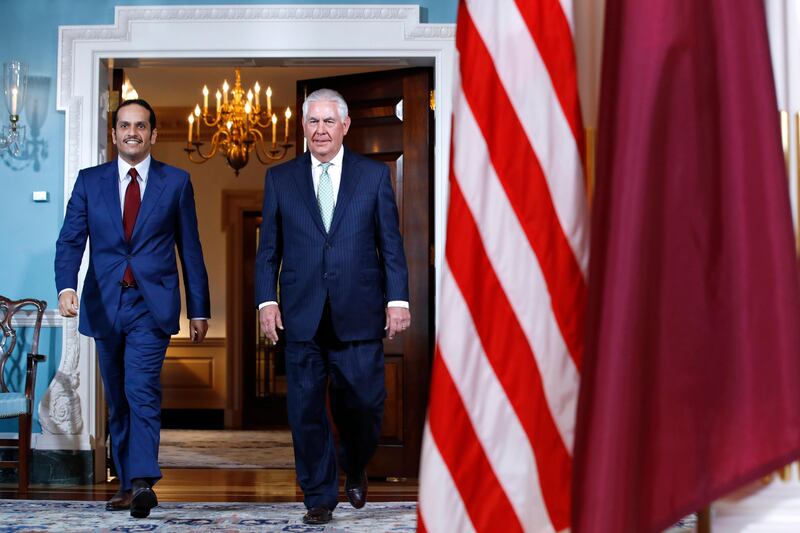As the confrontation between the Arab coalition and Qatar nears the one-month mark, with Doha insisting it intends to reject the 13 demands placed before it, it’s becoming increasingly clear that if there is to be any kind of reconciliation it will be brokered by Washington.
The parties seem to recognise this, as the flurry of diplomatic activity in the American capital last week demonstrated. But the Trump administration still appears divided, uncertain and haunted by a series of unresolved questions that will undoubtedly shape the longer-term, and possibly decisive, American response.
Perhaps the most significant meeting last week was a dinner at which US secretary of state Rex Tillerson was joined by the foreign minister of Kuwait and the secretary-general of the United Nations, presumably to discuss this crisis. In that meeting, one could start to see the outlines of an international mediation troika that combines the global legitimacy of the UN, the regional Gulf credibility of Kuwait and the heft and power of the United States.
The state department seems keen to resolve the confrontation, but the White House apparently has yet to give it a green light to utilise Washington’s full influence. Sean Spicer, the president’s press secretary, continues to describe the stand-off as a “family issue” that should be resolved by the parties themselves without American interference.
However, many others in Washington are becoming increasingly alarmed at the potential costs to the US over the long run.
Concern not only focuses on emerging difficulties in optimizing and coordinating between the US military installations spread around the Gulf region, as Bahrain’s recent expulsion of Qataris working with the anti-ISIL campaign began to demonstrate. There’s also a strong American perception that unity among its allies is essential to the priorities of defeating terrorism and confronting Iran.
Moreover, Qatar has launched a fairly effective public relations campaign in Washington, painting itself as the victim of “counterrevolutionary autocrats” who are trying to bully a small neighbour for having an independent foreign policy and a free press. This caricature of reality has made substantial inroads in American perceptions because it has been largely unopposed in policy-framing, if not policy-making, circles.
Therefore, once a unified policy coalesces in the administration, Washington is likely to push for an early resolution based on Gulf Arab reconciliation.
The challenge will be that the countries confronting Doha are clear that their demands are non-negotiable, while Qatar is extremely unlikely to submit to them as promulgated.
The Arab coalition doesn’t seem at all willing to negotiate directly, or compromise, with Qatar. But they might be willing to reach understandings with Washington, which could then have its own complimentary “bilateral” arrangements with Doha.
Ideas are already circulating involving the embedding of US treasury officials in Qatari ministries and financial institutions, supervision of monthly audits and restructuring the management of Al Jazeera and other media.
The Qataris don’t rule these out, and while such ideas evidently won’t satisfy the coalition, they could be a start.
Washington’s ultimate posture will be shaped by the answers to several key questions.
First, is the coalition amenable to a resolution based on policy changes by Doha or does it want to give Qatar a straightforward choice of capitulation or indefinite isolation? It will be much easier for Washington to work with the first than the second.
Second, the 13 demands have left many Americans wondering what the primary motivation for the campaign is, because they cover so many varied, disparate elements.
Is this campaign primarily driven by differences over the Muslim Brotherhood and other extremists, and mainly designed to get Qatar to stop promoting radical ideas and demagogues?
Or is it primarily conceptualised as a first step in what may ultimately prove a far broader campaign to confront and rollback Iranian influence, by getting the Arab and Gulf house in order and denying Tehran a covert ally and potential mouthpiece and conduit to Arab public opinion?
The consensus view in Washington is that it must primarily be one or the other. It could be both, of course. But not equally.
The US assumption is that there is an overarching strategic goal, in the singular. And, right now, few if any Americans, including the most well-informed, have a strong sense of which it is.
The inclusion, for example, of the demand to end the Turkish military presence in Qatar in the list further muddied the issues in Washington. This doesn’t seem directly connected to either Iran, or to terrorism.
The idea that Turkey and Qatar, along with Hamas and Muslim Brotherhood groups, constitute a subversive and dangerous Islamist alliance might be convincing in much of the Gulf. But such accusations are still a stretch in Washington regarding a long-standing NATO ally.
Of course, if the countries confronting Qatar seek or welcome a separation, or if Doha is completely recalcitrant -- or both – such American questions won’t matter, because any reconciliation effort is bound to fail. But the American drive to understand and resolve the crisis, in the US national interest, is only likely to strengthen if the stand-off drags on or, especially, intensifies.
Hussein Ibish is a senior resident scholar at the Arab Gulf States Institute in Washington





